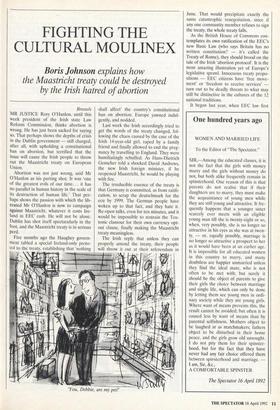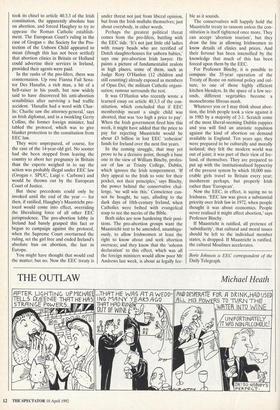FIGHTING THE CULTURAL MOULINEX
the Maastricht treaty could be destroyed
by the Irish hatred of abortion
Brussels MR JUSTICE Rory O'Hanlon, until this week president of the Irish state Law Reform Commission, thinks abortion is wrong. He has just been sacked for saying so. That perhaps shows the depths of crisis in the Dublin government — still charged, after all, with upholding a constitutional ban on abortion, but terrified that the issue will cause the Irish people to throw out the Maastricht treaty on European Union.
Abortion was not just wrong, said Mr O'Hanlon as his parting shot. It was 'one of the greatest evils of our time... it has no parallel in human history in the scale of its destruction of human life.' That per- haps shows the passion with which the lib- erated Mr O'Hanlon is now to campaign against Maastricht, whatever it costs Ire- land in EEC cash. He will not be alone. Dublin has shot itself spectacularly in the foot, and the Maastricht treaty is in serious peril.
Five months ago the Haughey govern- ment tabled a special Ireland-only proto- col to the treaty, establishing that '1101111m,
shall affect' the country's constitutional ban on abortion. Europe yawned indul- gently, and nodded.
Last week the Irish accordingly tried to get the words of the treaty changed, fol- lowing the chaos caused by the case of the Irish 14-year-old girl, raped by a family friend and finally allowed to end the preg- nancy by travelling to England. They were humiliatingly rebuffed. As Hans-Dietrich Genscher told a shocked David Andrews, the new Irish foreign minister, if he reopened Maastricht, he would be playing with fire.
The irreducible essence of the treaty is that Germany is committed, as from ratifi- cation, to scrap the deutschmark for the ecu by 1999. The German people have woken up to that fact, and they hate it. Re-open talks, even for ten minutes, and it would be impossible to restrain the Teu- tonic clamour for their own currency opt- out clause, finally making the Maastricht treaty meaningless.
The Irish reply that unless they can properly amend the treaty, their people ∎ till throw it out at their referendum in 'You, Debbie, are my pet!' June. That would precipitate exactly the same catastrophic renegotiation, since if any one community member refuses to sign the treaty, the whole treaty falls.
As the British House of Commons con- templates its own ratification of the EEC's new Basic Law (who says Britain has no written constitution? — it's called the Treaty of Rome), they should brood on the tale of the Irish 'abortion protocol'. It is the most amazing illustration yet of Europe's legislative sprawl. Innocuous treaty propo- sitions — EEC citizens have 'free move- ment' or 'freedom to receive services' turn out to be deadly threats to what may still be distinctive in the cultures of the 12 national traditions.
It began last year, when EEC law first took its chisel to article 40.3.3 of the Irish constitution, the apparently absolute ban on abortion, and forced Haughey to try to appease the Roman Catholic establish- ment. The European Court's ruling in the case of Grogan v. the Society for the Pro- tection of the Unborn Child appeared to mean (though this has not been settled) that abortion clinics in Britain or Holland could advertise their services in Ireland, provided their agents were paid.
In the ranks of the pro-lifers, there was consternation. Up rose Fianna Fail Sena- tor Des Hanafin, a rich man, a bit of a hell-raiser in his youth, but now widely said to have discovered his anti-abortion sensibilities after surviving a bad traffic accident. 'Hanafin had a word with Char- lie; Charlie saw the attorney-general,' says an Irish diplomat, and in a twinkling Gerry Collins, the former foreign minister, had tabled the protocol, which was to give blanket protection to the constitution from EEC law.
They were unprepared, of course, for the case of the 14-year-old girl. No sooner had she been stopped from leaving the country to abort her pregnancy in Britain than the experts weighed in to say the action was probably illegal under EEC law (Grogan v. SPUC, Luigi v. Carbone) and would be thrown out by the European Court of Justice.
But these precedents could only be invoked until the end of the year — for then, if ratified, Haughey's Maastricht pro- tocol would come into effect, overriding the liberalising force of all other EEC jurisprudence. The pro-abortion lobby in Ireland had barely grasped this fact or begun to campaign against the protocol, when the Supreme Court overturned the ruling, set the girl free and ended Ireland's absolute ban on abortion, the last in Europe.
You might have thought that would end the matter; but no. Now the EEC treaty is under threat not just from liberal opinion, but from the Irish mullahs themselves; just about everybody, in other words.
Perhaps the greatest political threat comes from the pro-lifers, battling with the EEC tide. 'It's not just little old ladies with rosary beads who are terrified of Dutch slaughterhouses for unborn babies,' says one pro-abortion Irish lawyer. He paints a picture of fundamentalist zealots in high places, some of them, such as Judge Rory O'Hanlon (12 children and still counting) already exposed as members of Opus Dei, the militant Catholic organi- sation; rumour surrounds the rest.
It was O'Hanlon who recently wrote a learned essay on article 40.3.3 of the con- stitution, which concluded that if EEC membership meant a single child was aborted, that was 'too high a price to pay'. When the Irish government fired him this week, it might have added that the price to pay for rejecting Maastricht would be about £3 billion in lost EEC 'cohesion' funds for Ireland over the next five years.
In the coming struggle, that may yet prove to be a decisive point, though a base one in the view of William Binchy, profes- sor of law at Trinity College, Dublin, which ignores the Irish temperament. 'If they appeal to the Irish to vote for their pocket, not their principles,' says Binchy, the power behind the conservative chal- lenge, 'we will win this.' Conscience can- not be bought, he says, alluding to the dark days of 18th-century Ireland, when Catholics were bribed with evangelical soup to see the merits of the Bible.
Both sides are now hardening their posi- tions. The pro-abortion groups want the Maastricht text to be amended, unambigu- ously, to allow Irishwomen at least the right to know about and seek abortion overseas; and they know that the 'solemn declaration' to this effect, which was all the foreign ministers would allow poor Mr Andrews last week, is about as legally fee- ble as it sounds.
The conservatives will happily hold the Maastricht treaty to ransom unless the con- stitution is itself tightened once more. They can accept 'abortion tourism', but. they draw the line at allowing Irishwomen to know details of clinics and prices. And their fervour has been intensified by the knowledge that much of this has been forced upon them by the EEC.
For Professor Binchy, it is possible to compare the 35-year operation of the Treaty of Rome on national policy and cul- ture, to one of those highly efficient kitchen blenders. In the space of a few sec- onds, different vegetables become a monochrome fibrous mash.
Whatever you or I may think about abor- tion, the Irish people took a view against it in 1983 by a majority of 2-1. Scratch some of the most liberal-seeming Dublin yuppies and you will find an atavistic repulsion against the kind of abortion on demand available in England. Ten years ago, they were prepared to be culturally and morally isolated; they felt the modern world was out of joint; it was part of their view of Ire- land, of themselves. They are prepared to put up with the institutionalised hypocrisy of the present system by which 10,000 mis- erable girls travel to Britain every year; incoherent perhaps, but properly Irish rather than 'European'.
Now the EEC, in effect, is saying no to Irishness. 'EEC law was given a substantial priority over Irish law in 1972, when people thought it was about economics. People never realised it might affect abortion,' says Professor Binchy.
If Maastricht is ratified, all pretence of `subsidiarity', that cultural and moral issues should be left to the individual member states, is dropped. If Maastricht is ratified, the cultural Moulinex accelerates.
Boris Johnson is EEC correspondent of the Daily Telegraph.



















































 Previous page
Previous page